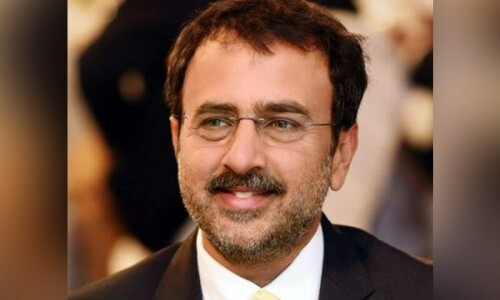ISLAMABAD: Power Minister Awais Leghari on Friday said a special task force was currently working on finding out fault lines with the independent power producers (IPPs) for mutual and amicable corrections, but the government could not and would not take any adverse actions unilaterally.
Giving a policy statement before the Senate standing committee on power, presided over by PTI Senator Mohsin Aziz, the minister announced that given the unaffordable tariffs, he had also ordered the reassessment of estimated tariffs of upcoming projects like Diamer-Bhasha, Chashma Nuclear’s C-5 to conclude if they had rightly been committed for next 10-year planning in Indicative Generation Capacity Expansion Plan (IGCEP).
He said the cost of hydroelectricity from the Diamir Bhasha Dam would be very high. “I think these can also push up overall tariffs,” he said, adding that no new project would be contracted in the public or private sector over the next 10 years, except those already in pipeline and about 700MW of renewable plants.
He warned that any misstep for single-handed correction or adverse action could expose Pakistan to heavy penalties in international arbitration as happened with Reko Diq and the nation had to pay big price for contract violation.
Fears any misstep for single-handed correction can expose Pakistan to heavy fines in arbitration
“We are looking into the fault lines…will do whatever possible within the law and the contractual obligations and transparently,” he said, adding all contracts had protection of law and the state of Pakistan had extended sovereign guarantees.
“We cannot single-handedly put them to trash,” he said, adding “their contracts cannot be re-opened, we cannot call them to shut down.”
Responding to various questions, mostly from PTI senators, Mr Leghari also put on record that Muhammad Ali Commission had observed that certain IPPs had recovered their investments in two-four years apparently through over-invoicing and in the absence of heat rate audits and had thus suggested a detailed study to reach a conclusion.
However, he said the PTI government did not proceed with heat rate audits and instead facilitated IPPs by diverting the process towards arbitration which gave space to the IPPs. The arbitration process, if started today, could expose the government to penalties because “we don’t have heat rate study even today”, he said adding “nobody looks outside the contract at London arbitration”.
The minister said he was working with Muhammad Ali in the task force that would working on three directions. The projects which have become expensive in comparison to new plants and have two to three years of outstanding contractual life may be offered net present value of their contractual return for the remaining period. This can be helpful in some tariff reduction and could be done amicably and mutual consent.
Then some others could be shifted from “take or pay” to “take and pay” and some others with one or two-year life could be given fixed O&M and return. “We are assessing each and everything relating to IPPs and would be able to reach some conclusion and give presentation along with Muhammad Ali for a way forward but within the domains of law and contracts.
He said about 1875MW worth of expensive project if closed could result in two hours of load shedding in peak summer but save Rs50bn but he had been wrongly quoted as if he was suggesting Rs50bn saving with two-hours load shedding. He said Pakistan had made arrangements for power supply like rich countries.
Responding to questions, Nepra chairman Waseem Mukhtar acknowledged a continuous decrease in electricity demand and the regulator did not intend to add more capacity to the grid. “Our electricity demand is continuously decreasing,” he said.
Transparency sought
Senator Shibli Faraz criticised Nepra’s independence and questioned its recent tariff adjustments. He inquired whether Nepra had increased electricity costs by Rs3 instead of the anticipated Rs5. He demanded transparency regarding the increase in electricity prices over the past two years and urged the provision of detailed reports on power projects nationwide.
Published in Dawn, August 31st, 2024















































